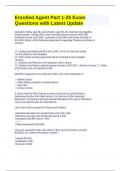Enrolled Agent Part 1-25 Exam
Questions with Latest Update
Question: Reba, age 88, and Charles, age 90, are married, live together,
and file jointly. During 2010, they received interest income of $3,000,
dividend income of $1,500, a pension of $10,000 and Social Security of
$15,000. Which of the following statements regarding Charles and Reba is
correct?
A. Charles and Reba will file Form 1040, Sch R to claim the credit
for the elderly or the disabled.
B. Their social security payments will be included in their taxable
income.
C. Charles and Reba are not required to file a return.
D. Charles and Reba's adjusted gross income is $31,500. - Answer-Answer: C. Reba
and Charles are not required to file.
Whether taxpayer(s) are required to file a tax return depends on:
~ Marital Status
~ Filing Status (related to marital status)
~ Age, and
~ Gross Income
A return must be filed if gross income is at least an amount that is
determined by the first three factors. It is the sum of the standard
deduction, exemptions and any special allowances for age or blindness.
There are special rules for dependents.
Let's look at the numbers for Reba and Charles:
Standard deduction for married joint return $11,400
Allowance for age over 65 ($1,100 each) 2,200
Exemption ($3,650 each) 7,300
------
Filing requirement $20,900
They are required to file a tax return if their gross income is at least
$20,900. So, what's their gross income?
Interest $3,000
Dividends 1,500
Pension 10,000
,-------
$14,500
What, you ask, about that $15,000 in Social Security payments? It would
be included in their gross income only if their total income, including
tax-exempt income and one-half of social security benefits is more than
$32,000. (Not true for Reba and Charles.)
The credit for the elderly or the disabled is not a refundable credit.
Charles and Reba have no tax liability.
(A person whose 65th birthday occurs on January 1 has attained age 65 at
the end of the previous year.)
This is long explanation for what is really an easy question.
Question: Mr. Allen died on October 31, 2009. His gross estate was valued
at $670,000. Unless an extension is granted, a Federal Estate Tax Return
(Form 706) must be filed on or before:
A. May 15,2010
B. February 15,2010
C. July 31,2010
D. A Federal Estate Tax Return does not have to be filed. - Answer-Answer: D. A
Federal Estate Tax Return does not have to be filed.
For an individual who died in 2009, an estate tax return, Form 706,
must be filed if the gross estate, plus any adjusted taxable gifts and
specific gift tax exemption, is more than $3,500,000.
For decedents in 2010 only, special rules applied. There was no estate
tax due and no stepped-up basis, or the old rules could be elected. For
2011 and beyond, the old rules apply.
Here's the skinny on filing if a return has to be filed.
Form 706 must be filed within 9 months of the date of death unless an
extension has been granted. Nine months after October 31, 2009, is
July 31,2010 . Bingo!!!
Question: A taxpayer is not required to make the fourth (January 15)
Estimated payment of tax if which of the following statements is true?
A. Her total tax for the year is less than $1,000.
, B. Her previous estimated payments are at least 75% of the tax she
expects for the entire year.
C. She files her 2010 Form 1040 by February 1, 2011 , and pays the
rest of the tax due.
D. She files Form 4868, Application for Automatic Extension of Time
To File U.S. Individual Tax Return by December 31, 2010. - Answer-Answer: C. She
can hold on to her money for another two weeks.
If she files her 2010 Form 1040 or Form 1040A by January 31, 2011, and
pays the rest of the tax she owes, a taxpayer need not make the estimated
payment that would be due on January 15.
There are special rules for qualified farmers.
Question: Generally, if the taxpayer is a minister of a church, his
earnings For the services he performs as a minister, whether he is an
employee of his church or a self-employed person under the common law
rules, will be subject to self employment tax. Which of the following
will exempt him from the tax?
A. He has requested and received an exemption from the IRS.
B. He is a member of a religious order and has not taken a vow of
poverty.
C. He is a Christian Science practitioner.
D. He donates all of his stipend to charity. - Answer-Answer: A.
A minister must include income from services performed as a minister when
figuring his net earnings from self-employment unless he has an exemption
from self-employment tax.
This also applies to Christian Science practitioners and members of a
religious order who have not taken a vow of poverty.
Donation of the stipend to charity will reduce the minister's income tax,
but will not reduce his self-employment tax.
Question: If a regulated investment company (mutual fund) or real estate
investment trust (REIT) declares a dividend (including any exempt-
interest dividend) in October, November, or December, payable to
shareholders of record on a date in one of those months but actually
pays the dividend during January of the next calendar year, the taxpayer
is considered to have received the dividend on which of the following
dates?




